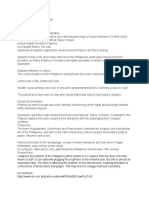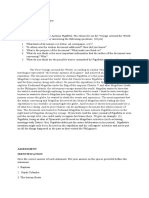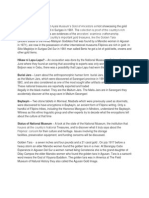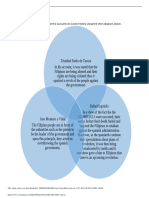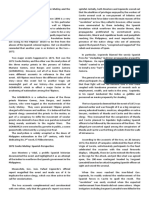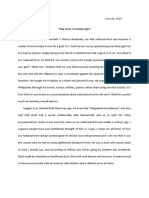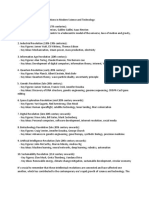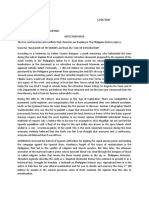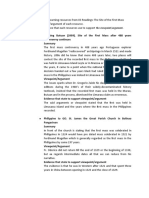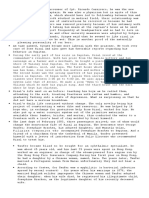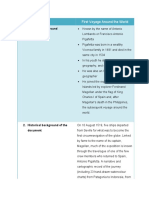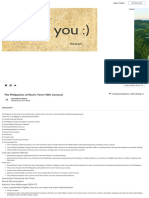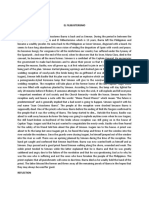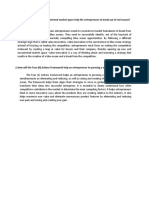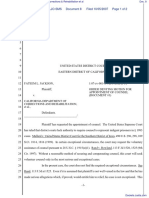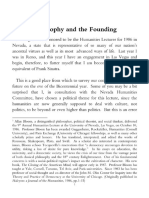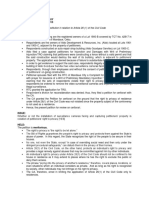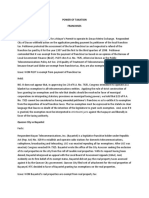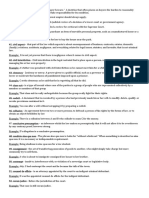Professional Documents
Culture Documents
Identifying and Diagnosing Problems, The UN's Comparative Advantage
Identifying and Diagnosing Problems, The UN's Comparative Advantage
Uploaded by
vivian ternalOriginal Description:
Original Title
Copyright
Available Formats
Share this document
Did you find this document useful?
Is this content inappropriate?
Report this DocumentCopyright:
Available Formats
Identifying and Diagnosing Problems, The UN's Comparative Advantage
Identifying and Diagnosing Problems, The UN's Comparative Advantage
Uploaded by
vivian ternalCopyright:
Available Formats
Identifying and Diagnosing Problems, the UN's Comparative Advantage
The UN's primary challenges in the twenty-first century are the same as they have been since 1945:
knowledge, norms, policy, institutions, and compliance. A crucial role in any of the five stages might
bring problem-solving efforts to a halt. The international organization has played and will continue to
play four critical roles in detecting and diagnosing problems and thereby closing gaps: controlling
knowledge; establishing standards; recommending policies; and institutionalizing concepts.
Formulating Recommendations
As new issues and norms develop, they reveal policy gaps that require attention as well. Once norms
begin to shift and become ubiquitous, the next stage is to develop a range of potential mechanisms by
which governments, their citizens, and IGOs might influence behavior. The policy stage is concerned
with the formulation of principles and actions that an organization is expected to adopt in response to
certain situations. Perhaps a straightforward but effective approach to demonstrate the process of
developing suggestions is to analyze a major issue in global governance, namely civil society, and the
UN's intellectual contribution to it. Since the Charter's inception, civil society, at the very least NGOs,
have been present - Article 71 specifically permits for their involvement. NGOs, on the other hand,
played a little role in an organization of member states during the Cold War, since governments,
particularly those of the socialist bloc and the Third World, frequently sought to suppress non-state
voices they regarded as a threat to sovereignty. By the twenty-first century, however, such voices have
multiplied in number, diversity, and volume — making them much more difficult to ignore.
Institutionalizing Ideas
Perhaps a straightforward but effective approach to demonstrate the process of developing suggestions
is to analyze a major issue in global governance, namely civil society, and the UN's intellectual
contribution to it. Since the Charter's inception, civil society, at the very least NGOs, have been present -
Article 71 specifically permits for their involvement. NGOs, on the other hand, played a little role in an
organization of member states during the Cold War, since governments, particularly those of the
socialist bloc and the Third World, frequently sought to suppress non-state voices they regarded as a
threat to sovereignty. By the twenty-first century, however, such voices have multiplied in number,
diversity, and volume — making them much more difficult to ignore. A policy must still be executed, and
problems and flaws may arise during implementation. For example, the zero-tolerance policy regarding
sexual exploitation of UN soldiers has been in place for some years, but the problem persists (Aoi, de
Coning, and Thakur, 2007). Inevitably, even with complete information, appropriate standards, policies,
and operations to support them, certain individuals or organizations will always cheat, challenge, and
violate the standards and regulations. As a result, all communities have procedures in place to identify
violators and outlaws, prosecute them, and punish convicted criminals, deterring future violators. The
United Nations lacks the mechanisms and processes for ensuring conformity with international
standards and regulations.
You might also like
- ENG - Professional Football Player ContractDocument6 pagesENG - Professional Football Player Contractsaratvega80% (5)
- Elusive Peasant Group 5Document3 pagesElusive Peasant Group 5FrancisNo ratings yet
- 05 Hau - Necessary Fictions IntroductionDocument14 pages05 Hau - Necessary Fictions Introductionclaire yowsNo ratings yet
- Why Did The Spaniards Partake in The Blood Pact With The PreDocument1 pageWhy Did The Spaniards Partake in The Blood Pact With The PreChavs Del Rosario100% (1)
- Chapter 5 Sci TechDocument15 pagesChapter 5 Sci TechJudy UrciaNo ratings yet
- RizalDocument1 pageRizalAudzkieNo ratings yet
- The Proclamation of The Philippine IndepenceDocument5 pagesThe Proclamation of The Philippine IndepenceMANUELA NADERANo ratings yet
- Content Presentation and Analysis of The Important Historical InformationDocument2 pagesContent Presentation and Analysis of The Important Historical InformationKyle Patrick MartinezNo ratings yet
- What Is Cavite Mutiny?Document2 pagesWhat Is Cavite Mutiny?Generose Camu100% (1)
- Module 1 Science Technology and SocietyDocument12 pagesModule 1 Science Technology and SocietyFatima NatividadNo ratings yet
- Riph ActivityDocument2 pagesRiph ActivityDanelle ObañaNo ratings yet
- Philippines TreasureDocument2 pagesPhilippines TreasureJohn Aaron TamayoNo ratings yet
- Jones Law of 1916 (Philippine Autonomy Act of 1916)Document16 pagesJones Law of 1916 (Philippine Autonomy Act of 1916)Irin200No ratings yet
- Cavite Mutiny 1) Compare and Contrast The Accounts On Cavite Mutiny Using The Venn Diagram AboveDocument3 pagesCavite Mutiny 1) Compare and Contrast The Accounts On Cavite Mutiny Using The Venn Diagram AboveRuth VargasNo ratings yet
- Module-7 RizalDocument14 pagesModule-7 RizalLester Amado100% (3)
- Fighting For Independence: The Cavite Mutiny and The Cry of BalintawakDocument3 pagesFighting For Independence: The Cavite Mutiny and The Cry of BalintawakArmein DuqueNo ratings yet
- Readings 2: (Proclamation) Act of Proclamation of Independence of The Filipino People Pre-Reading Activity Background of The AuthorDocument4 pagesReadings 2: (Proclamation) Act of Proclamation of Independence of The Filipino People Pre-Reading Activity Background of The AuthorChristine EvangelistaNo ratings yet
- FIRST VOYAGE AROUND THE WORLD BY MAGELLAN of Antonio PigafettaDocument1 pageFIRST VOYAGE AROUND THE WORLD BY MAGELLAN of Antonio PigafettaTech UserNo ratings yet
- Related Events Before and After The Death of Rizal: Mac-Mac Gatan Marvin Pame Phillip PinedaDocument33 pagesRelated Events Before and After The Death of Rizal: Mac-Mac Gatan Marvin Pame Phillip PinedaMarvin PameNo ratings yet
- Gay Issue A Century AgoDocument4 pagesGay Issue A Century AgoElla Jane EngoNo ratings yet
- The Friars in The PhilippinesDocument3 pagesThe Friars in The PhilippinesUmma Eugenio AgustinNo ratings yet
- Mga Buto Ni BonifacioDocument1 pageMga Buto Ni BonifacioCaite ViajeNo ratings yet
- PH HistoryDocument1 pagePH HistoryShawn RelosaNo ratings yet
- The Two Faces of The 1872 Cavite MunityDocument9 pagesThe Two Faces of The 1872 Cavite Munityjefferson paculbaNo ratings yet
- Emilio AguinaldoDocument4 pagesEmilio Aguinaldoerwinmiranda20033No ratings yet
- A Deconstruction RA 1425 Aka Rizal's Law - Feminist ApproachDocument7 pagesA Deconstruction RA 1425 Aka Rizal's Law - Feminist ApproachJosemar D. Romano IINo ratings yet
- Timeline of Intellectual Revolutions in Modern Science and TechnologyDocument2 pagesTimeline of Intellectual Revolutions in Modern Science and TechnologyPhillip GabaynoNo ratings yet
- Historical Thinking RPH Activity 1: Name: Readings in Philippine History Course/Yr/Sec. Ms. Mheralyn F. SilangDocument3 pagesHistorical Thinking RPH Activity 1: Name: Readings in Philippine History Course/Yr/Sec. Ms. Mheralyn F. SilangChristian DelacruzNo ratings yet
- Document Analysis Worksheet DocumentDocument3 pagesDocument Analysis Worksheet DocumentJinky SanturiasNo ratings yet
- Chapter 9 - Life and Works of Rizal - Philippines As A Century Hence (Filipinas Dentro de Cien Años)Document10 pagesChapter 9 - Life and Works of Rizal - Philippines As A Century Hence (Filipinas Dentro de Cien Años)Ma AntonioNo ratings yet
- Balintawak Points PDFDocument2 pagesBalintawak Points PDFMark SupsupinNo ratings yet
- GEC109 - Ll2Document3 pagesGEC109 - Ll2Zumainah Bato AliNo ratings yet
- Social Studies 104Document4 pagesSocial Studies 104Basco Martin JrNo ratings yet
- The First FilipinoDocument2 pagesThe First FilipinoRasalyn Cericos ValoisNo ratings yet
- Reflection PaperDocument1 pageReflection PaperFaizal MaligaNo ratings yet
- 04 Quiz 1 ARG Performance TaskDocument2 pages04 Quiz 1 ARG Performance TaskTrish SalangNo ratings yet
- GROUP 4 Content Contextual Analysis Kartilya NG KatipunanDocument4 pagesGROUP 4 Content Contextual Analysis Kartilya NG KatipunanLJ GundayNo ratings yet
- Position Paper-GarciaDocument5 pagesPosition Paper-GarciaArlene GarciaNo ratings yet
- Chapter 15Document32 pagesChapter 15Carl OnrubsNo ratings yet
- Rizal Life and Works Chapter 6Document2 pagesRizal Life and Works Chapter 6Edzle LabianoNo ratings yet
- While Watching The Documentary Video About The TageanDocument2 pagesWhile Watching The Documentary Video About The Tageananne marie100% (1)
- 03 Activity 3 Ja BSBA111Document1 page03 Activity 3 Ja BSBA111ken dahunan100% (1)
- (LESSON 2) - HIST1023 - Life and Works of RizalDocument22 pages(LESSON 2) - HIST1023 - Life and Works of RizalJazzle eirol tanNo ratings yet
- Module 2 Unit 2 - Balintawak or PugadlawinDocument6 pagesModule 2 Unit 2 - Balintawak or PugadlawinNichole Joy XielSera Tan0% (1)
- Proposals To The New Philippine ConstitutionDocument3 pagesProposals To The New Philippine ConstitutionCourse Chegg100% (2)
- RizalTP (Prefi)Document9 pagesRizalTP (Prefi)Jaspher TamposNo ratings yet
- Juan Sitges Was A Successor of CPTDocument1 pageJuan Sitges Was A Successor of CPTKristine PacalNo ratings yet
- Filipino Grievances Against WoodDocument4 pagesFilipino Grievances Against WoodCAÑO, KRISTINE RAZEL M.100% (1)
- Lesson 5-Kartilya NG KatipunanDocument12 pagesLesson 5-Kartilya NG KatipunanKhyla ValenzuelaNo ratings yet
- First Voyage Around The WorldDocument5 pagesFirst Voyage Around The WorldAmer ArtesanoNo ratings yet
- Enabling Stakeholders of Coron PDFDocument11 pagesEnabling Stakeholders of Coron PDFDevie Filasol100% (1)
- Market Integration and The Global Interstate SystemDocument1 pageMarket Integration and The Global Interstate SystemKaitlinn Jamila Altatis100% (1)
- The Philippines of Rizal's Time (19th Century) by Jeanelle Calosa On PreziDocument3 pagesThe Philippines of Rizal's Time (19th Century) by Jeanelle Calosa On PreziJewel CabigonNo ratings yet
- Module 3Document11 pagesModule 3Ronesa Omar100% (1)
- Riph Lesson 4Document2 pagesRiph Lesson 4Antenorio Nestlyn MaeNo ratings yet
- Final OutputDocument15 pagesFinal OutputSharmine Joy AsokNo ratings yet
- KKK and Kartilya NG KatipunanDocument15 pagesKKK and Kartilya NG KatipunanRomalie Fullo GalletoNo ratings yet
- Week 9 Rizals Life and Works in London and ParisDocument33 pagesWeek 9 Rizals Life and Works in London and ParisVencint LaranNo ratings yet
- Seatwork (1 Item X 20 Points) Directions: Select A Web Publishing and Microblogging Site You Want To Focus On (E.g., Wix and Twitter)Document2 pagesSeatwork (1 Item X 20 Points) Directions: Select A Web Publishing and Microblogging Site You Want To Focus On (E.g., Wix and Twitter)vivian ternalNo ratings yet
- What Is Research?: Name: Date: Section: Score Idea Builder Instruction: Fill in The Boxes With The Correct InformationDocument1 pageWhat Is Research?: Name: Date: Section: Score Idea Builder Instruction: Fill in The Boxes With The Correct Informationvivian ternalNo ratings yet
- Communication Networks, New Media, and The StateDocument1 pageCommunication Networks, New Media, and The Statevivian ternalNo ratings yet
- 1.how Does Occupying An Uncontested Market Space Help The Entrepreneur To Break Out of Red Oceans?Document1 page1.how Does Occupying An Uncontested Market Space Help The Entrepreneur To Break Out of Red Oceans?vivian ternalNo ratings yet
- AerogardenDocument34 pagesAerogardenvivian ternalNo ratings yet
- Natural Resources and Environment Law SyllabusDocument4 pagesNatural Resources and Environment Law Syllabusペラルタ ヴィンセントスティーブNo ratings yet
- (PC) Jackson v. California Department of Corrections & Rehabilitation Et Al - Document No. 8Document2 pages(PC) Jackson v. California Department of Corrections & Rehabilitation Et Al - Document No. 8Justia.comNo ratings yet
- MRF United Workers Union Vs Government of Tamil Nadu On 8 September, 2009 PDFDocument14 pagesMRF United Workers Union Vs Government of Tamil Nadu On 8 September, 2009 PDFShaily AzimNo ratings yet
- Secosa Vs Heirs of Erwin Suarez FranciscoDocument1 pageSecosa Vs Heirs of Erwin Suarez Franciscojanice suyuNo ratings yet
- Statement of Interest of U.S. State Department in Support of Palestinian Authority Bond WaiverDocument4 pagesStatement of Interest of U.S. State Department in Support of Palestinian Authority Bond WaiverShurat HaDin - Israel Law CenterNo ratings yet
- Commercial Instruments The Law Merchant and Negotiability: University of Minnesota Law SchoolDocument19 pagesCommercial Instruments The Law Merchant and Negotiability: University of Minnesota Law SchoolEsther MaugoNo ratings yet
- K.V. Faylona For Petitioners-Appellants. L. L. Reyes For Respondents-AppelleesDocument4 pagesK.V. Faylona For Petitioners-Appellants. L. L. Reyes For Respondents-AppelleesJames WilliamNo ratings yet
- Partnership DeedDocument13 pagesPartnership DeedMuni ReddyNo ratings yet
- Warez TradingDocument26 pagesWarez Tradingapi-3860475No ratings yet
- Cancellation of Lis PendensDocument3 pagesCancellation of Lis PendensJanina Paño100% (1)
- Digest Phil. Press Institute vs. ComelecDocument1 pageDigest Phil. Press Institute vs. ComelecAkiNiHandiong100% (1)
- Fisher v. TrinidadDocument3 pagesFisher v. TrinidadMina AragonNo ratings yet
- Allan Bloom - ''Philosophy & The Founding'' (Las Vegas 1986)Document20 pagesAllan Bloom - ''Philosophy & The Founding'' (Las Vegas 1986)Docteur LarivièreNo ratings yet
- Khoo Hi Chiang V Public Prosecutor and Another AppealDocument20 pagesKhoo Hi Chiang V Public Prosecutor and Another AppealVinodh MariappaNo ratings yet
- Obli NotesDocument70 pagesObli NotesManny Carl ClarionNo ratings yet
- Navarro v. Ermita 2011 Digest (Plebiscite Requirements)Document4 pagesNavarro v. Ermita 2011 Digest (Plebiscite Requirements)Kirby Hipolito100% (2)
- OCR 2019 Boston Office (7-25-19)Document3 pagesOCR 2019 Boston Office (7-25-19)Simon CampbellNo ratings yet
- Spouses Hing v. ChoachuyDocument2 pagesSpouses Hing v. ChoachuyAnonChieNo ratings yet
- Case Digest: APEX Mining Co. v. Southeast Mindanao Gold Mining CorpDocument4 pagesCase Digest: APEX Mining Co. v. Southeast Mindanao Gold Mining CorpchrisNo ratings yet
- Combined Materials Criminal Law 2016Document52 pagesCombined Materials Criminal Law 2016Maria100% (3)
- AIR 1960 SC 554 Hamdard Dawakhana and Anr V Union of IndiaDocument18 pagesAIR 1960 SC 554 Hamdard Dawakhana and Anr V Union of IndiaHarsh Garg100% (1)
- North EnglandDocument194 pagesNorth EnglandNoel DomingoNo ratings yet
- Art. 25-36Document9 pagesArt. 25-36Rebecca ChanNo ratings yet
- SC Decision Preventive Suspension ExtendDocument34 pagesSC Decision Preventive Suspension ExtendCSC Legal Congress 2022No ratings yet
- HemaadmitcardDocument1 pageHemaadmitcardNiraj VaishanvNo ratings yet
- Ir 207.1 Syllabus 2022-2023Document9 pagesIr 207.1 Syllabus 2022-2023Nick BARRIATOSNo ratings yet
- LTD Case Digest Set 1Document2 pagesLTD Case Digest Set 1Delsie FalculanNo ratings yet
- CombinedDocument242 pagesCombinedLord AumarNo ratings yet
- JargonsDocument11 pagesJargonsPaulyn MarieNo ratings yet





